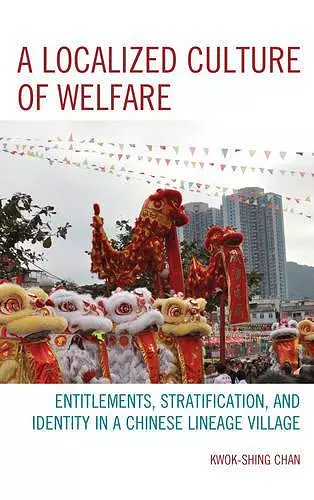A Localized Culture of Welfare
Entitlements, Stratification, and Identity in a Chinese Lineage Village
Format:Hardback
Publisher:Lexington Books
Published:25th Oct '12
Currently unavailable, and unfortunately no date known when it will be back

Hong Kong has undergone rapid and substantial social, economic, political and demographic changes since the 1970s. This book examines critically the real impact of these changes on a single surname village in rural Hong Kong. It draws on anthropological fieldwork conducted during the late 1990s and the early 2000s. This ethnographic study demonstrates that kinship, particularly agnatic kinship, has remained a valuable resource for Pang villagers, enabling them to acquire key welfare entitlements, and to secure a good measure of economic and social well-being. Kinship affiliation has provided and still provides (admittedly differential) access to political patronage and legal entitlements, financial assistance and the substantial benefits of corporate property-holding, physical protection and political leadership, employment, care-giving and support networks, housing needs, old age security, a ritually-imagined community, with a sense of spiritual well-being. Agnatic kinship has been organized as a corporate institution and as a quasi-religious community through which substantial support, protection, and privileged access is provided for villagers. At the same time, reliance on this elaborate “localized culture of welfare” has maintained or reinforced the contours of stratification and inequality among Pang villagers, even as lineage identity has remained largely intact in the face of changing external circumstances.
Through a detailed qualitative analysis of localized welfare practices, Chan examines the continued significance of lineage membership to the economic security and welfare of Hong Kong’s lineage villages. ... A Localized Culture of Welfare presents a rich ethnography with a series of stories of the lived experiences and everyday practices of welfare provision by various Pang families and their individual members. Chan’s case study offers an example of the ways in which rural and ethnic minority communities in both Hong Kong and China may respond to the gradual retrenchment of the state from welfare provision. This book will be of interest to anthropology students with a focus on Hong Kong and China’s changing sociocultural practices of lineage support, as well as to those examining localized practices of welfare provision. * The China Journal *
A Localized Culture of Welfare contributes to our understanding of kinship, welfare, and citizenship. It will be of interest to anthropologists who focus on welfare and security, family and lineage, indigeneity, and the social and political transformation of Hong Kong. * American Anthropologist *
This thesis on welfare and social security in a single-surname community in the New Territories makes an original contribution to the anthropology of Hong Kong, lineage studies, and the anthropology of social security and welfare. Large, single-surname communities have been paradigmatic in the study of Chinese social structure. The author’s understanding of what such a lineage actually does for individuals and how it determines rights, rules, and rituals to deal with everyday personal and political issues gives us a refreshing view of lineages in the modern world. The book reveals that patrilineal kinship continues to be an important factor in shaping life in Hong Kong, serving welfare and social security functions not served by the territory’s minimalist government. -- Frank Pieke, Leiden University
This is the first full-scale study of lineage communities in post-colonial Hong Kong, written by a young anthropologist who writes with skill and real insight. This book can be read as a sequel to the studies by several British and American anthropologists who studied such communities in the 1960s and 1970s. Chan's book will be of great interest to specialists in anthropology, sociology, Asian studies, and culture studies. It brings the story of Hong Kong's lineage communities up to the present. -- James L. Watson, Harvard University, Professor Emeritus, Harvard University
ISBN: 9780739166871
Dimensions: 237mm x 157mm x 21mm
Weight: 522g
236 pages